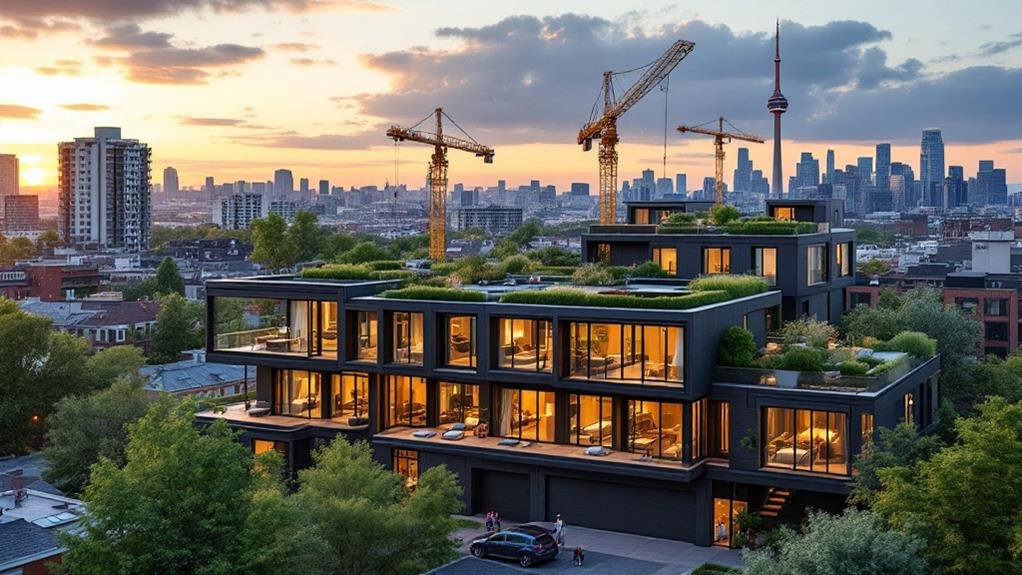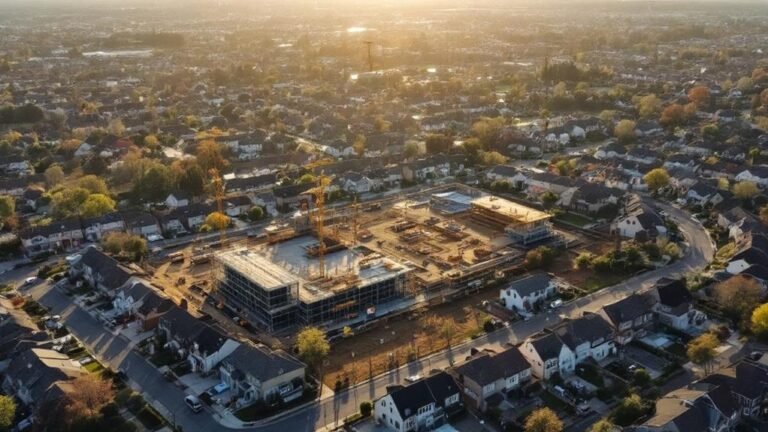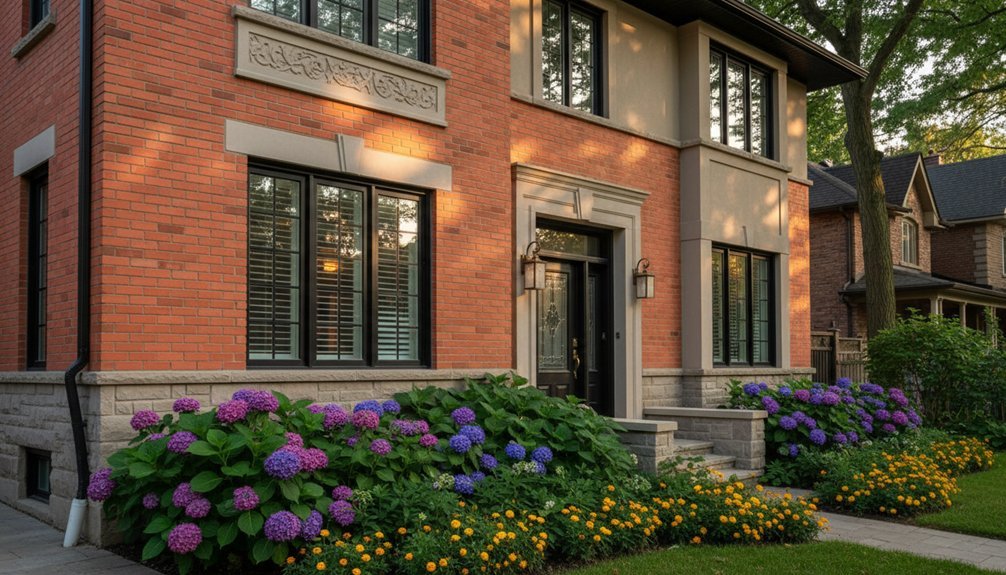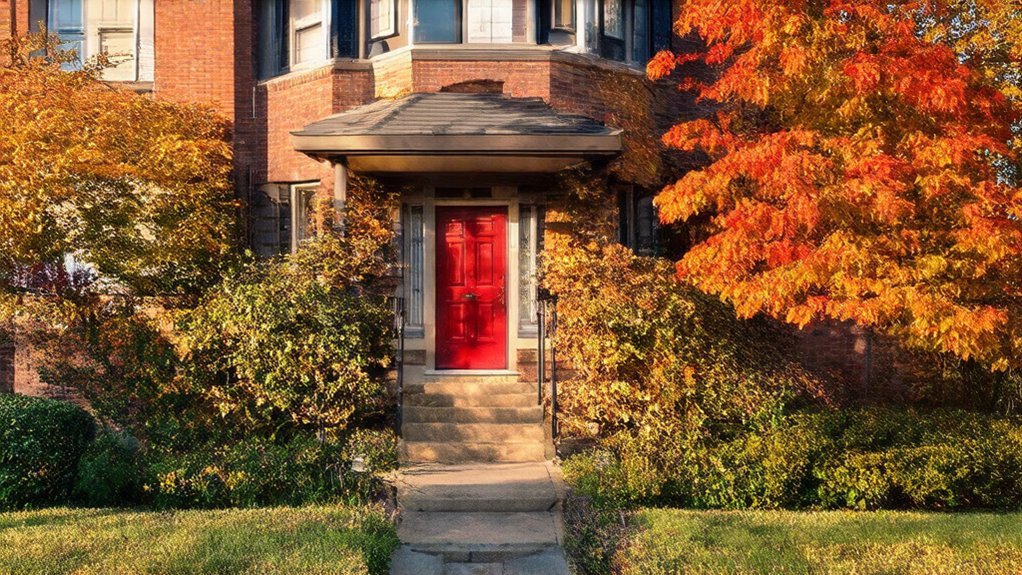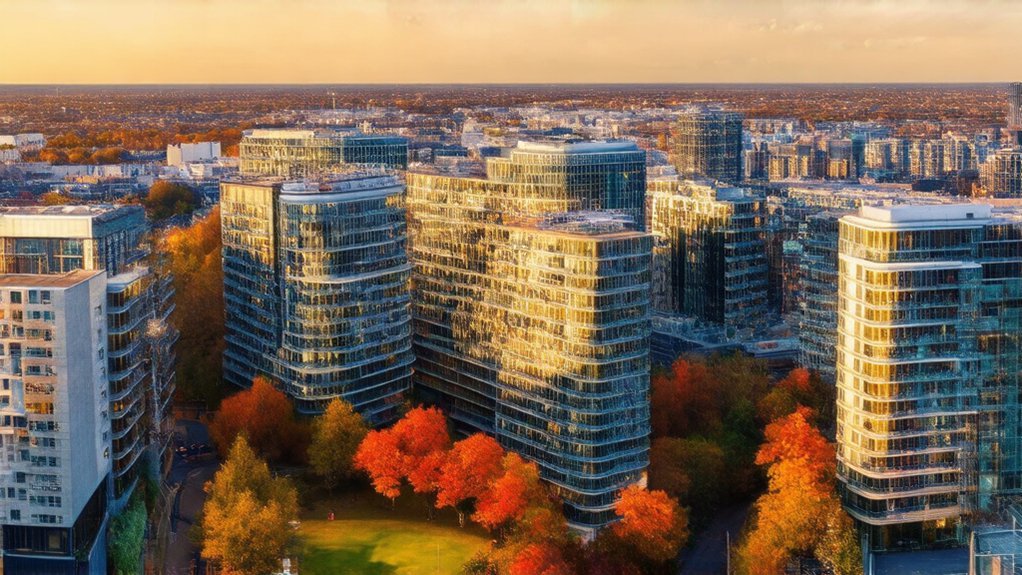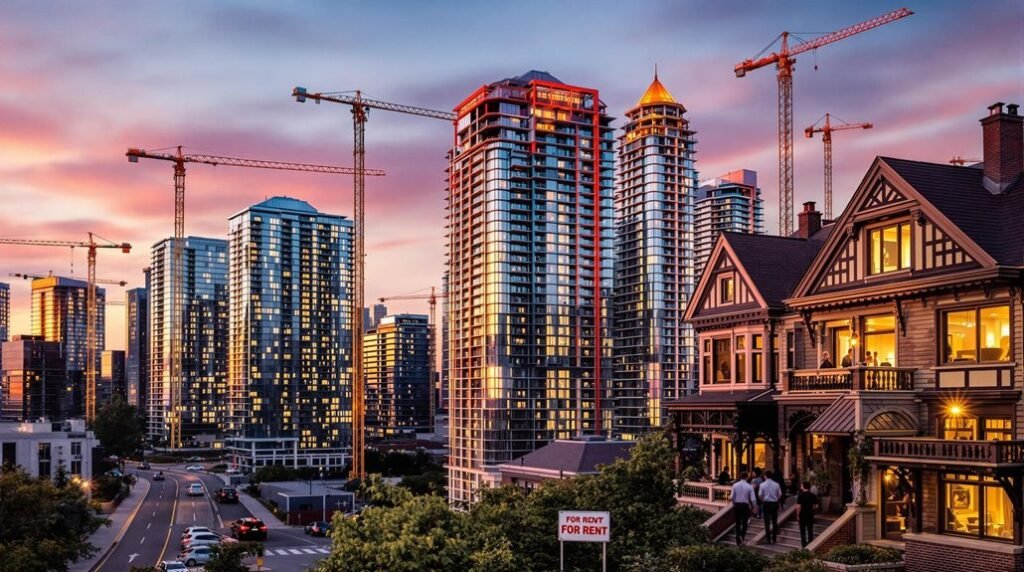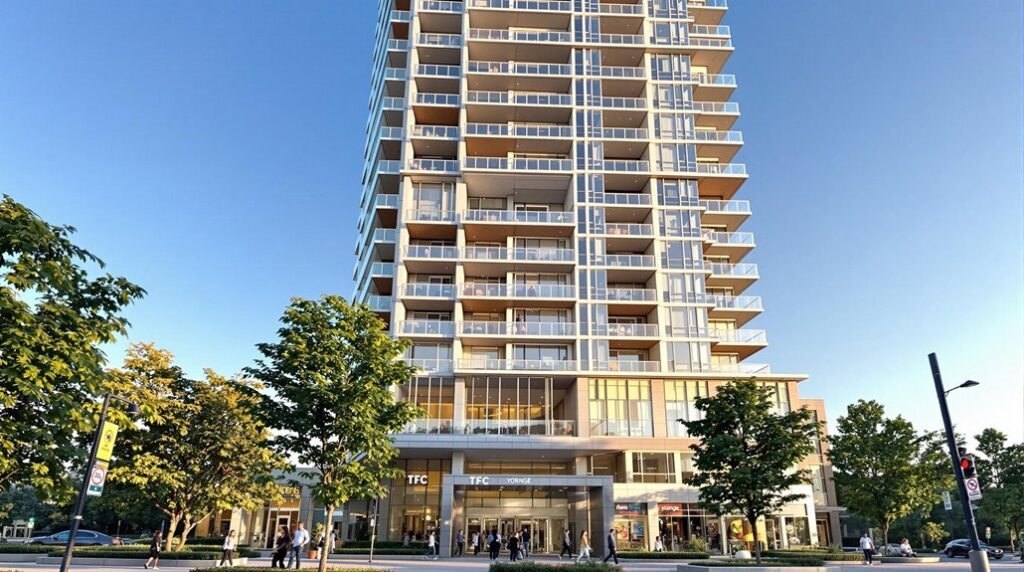You've likely heard about Toronto's housing crisis, but have you considered modular homes as a potential solution? These prefabricated structures offer quick assembly, cost efficiency, and sustainability—traits that could revolutionize the city's housing market. As a first-time buyer or investor, you might find modular homes an attractive option for affordable living or rental income. However, it's not all smooth sailing. Land acquisition, regulatory hurdles, and public perception present significant challenges. So, what's the real potential of modular homes in Toronto, and how might they reshape the urban landscape? Let's explore the possibilities and pitfalls.
Modular Homes: A Housing Crisis Solution?
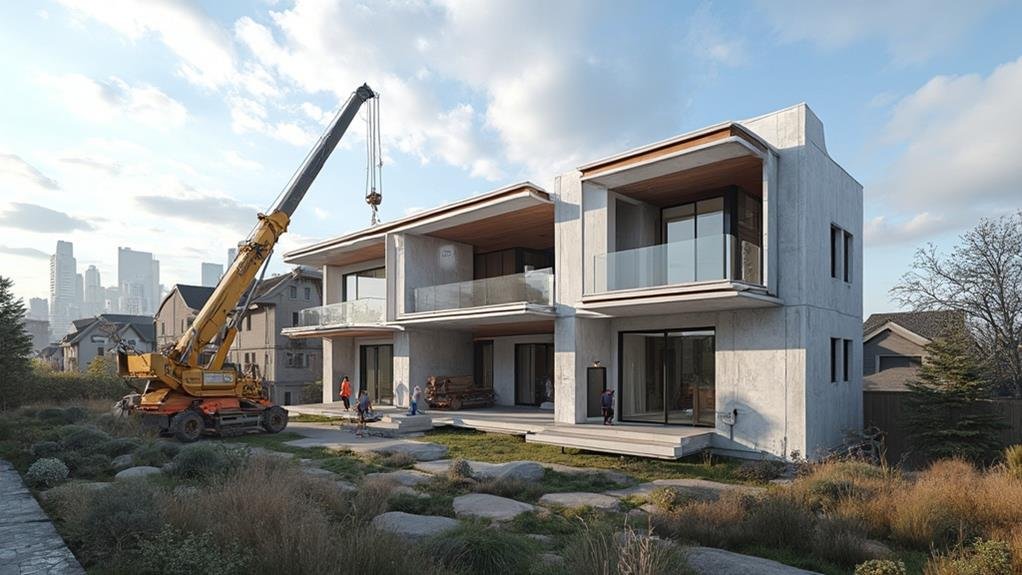
As Toronto grapples with its housing crisis, could modular homes be the answer? These prefabricated structures offer several advantages:
- Quick assembly on-site
- Lower construction costs
- Potential for affordability
Modular homes typically cost $300,000 to $350,000 for 600 sq. ft., considerably less than traditional housing options. They also provide sustainability benefits through efficient manufacturing processes and reduced waste.
Affordable housing options like these align with the City of Toronto's collaboration with non-profit organizations to enhance access to home ownership for low-income families.
However, challenges remain:
- Land ownership requirements
- Financing difficulties
- Regulatory hurdles
Despite these obstacles, modular homes show promise for community integration. They're ideal for landowners seeking rental income or families wanting to keep relatives close.
As the market develops, these homes could help diversify Toronto's housing stock. While not a complete solution, modular homes represent an innovative approach to addressing the city's housing shortage. Their potential impact on affordability and accessibility makes them worth considering in the broader context of urban development.
Cost Analysis of Prefab Housing
In recent years, the cost breakdown of prefab housing has become an essential factor for potential homeowners in Toronto. You'll find that modular homes offer significant sustainability benefits and construction efficiency compared to traditional builds.
Supply constraints in North York's real estate market have increased interest in alternative housing solutions like prefab homes. Here's a breakdown of costs:
- Average cost: $300,000 to $350,000 for 600 sq. ft.
- Construction costs: $500 per sq. ft., excluding land prep
- Cost allocation: 33% land, 33% hard costs, 33% taxes
Prefab homes can help you avoid some development charges, but you'll need to own the land first.
The current market makes it challenging to see a return on investment, as buyers often prefer traditional homes with yards. However, the efficiency of modular construction and potential for lower long-term costs make prefab housing an attractive option for those seeking affordable living solutions in Toronto's competitive market.
Land Ownership and Financing Challenges
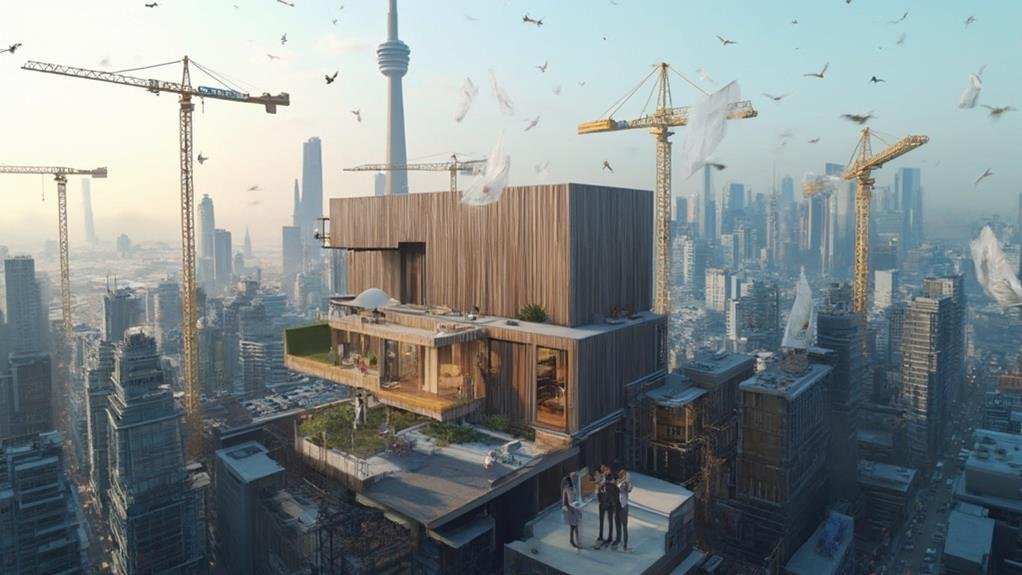
Land ownership hurdles and financing roadblocks present significant challenges for those interested in modular homes in Toronto.
You'll need to own land before placing a prefab unit, which can be a major obstacle in a city with limited available space. Land acquisition costs are high, often matching or exceeding the price of the modular home itself.
With detached home prices averaging $1.5 million in North York, finding affordable land for modular homes can be particularly challenging.
Financing options for modular homes differ from traditional mortgages. Banks may be hesitant to provide loans for these unconventional structures.
You'll likely need substantial capital or equity to secure financing. Here are key points to take into account:
- Land ownership is a prerequisite
- High upfront costs for land and construction
- Limited financing options from traditional lenders
- Need for significant personal capital or equity
These factors make it difficult for many potential buyers to enter the modular home market, despite the potential benefits of lower construction costs and faster build times.
Market Dynamics for Garden Suites
Garden suites represent a growing segment of Toronto's modular home market, but they face unique challenges. These compact structures offer homeowners a way to maximize their property's potential. However, the market for garden suites is still developing.
Here are key factors affecting their adoption:
- Design innovations are making garden suites more attractive and functional.
- Community acceptance varies, with some neighborhoods embracing the concept while others resist change.
- Zoning regulations can limit where garden suites can be built.
- Construction costs often exceed resale value, making it difficult for investors to profit.
- Financing options are limited, as traditional mortgages may not apply.
- Demand is growing among families looking to house relatives or generate rental income.
- The rental market for garden suites is emerging, offering affordable housing options.
Target Demographics and Rental Impact
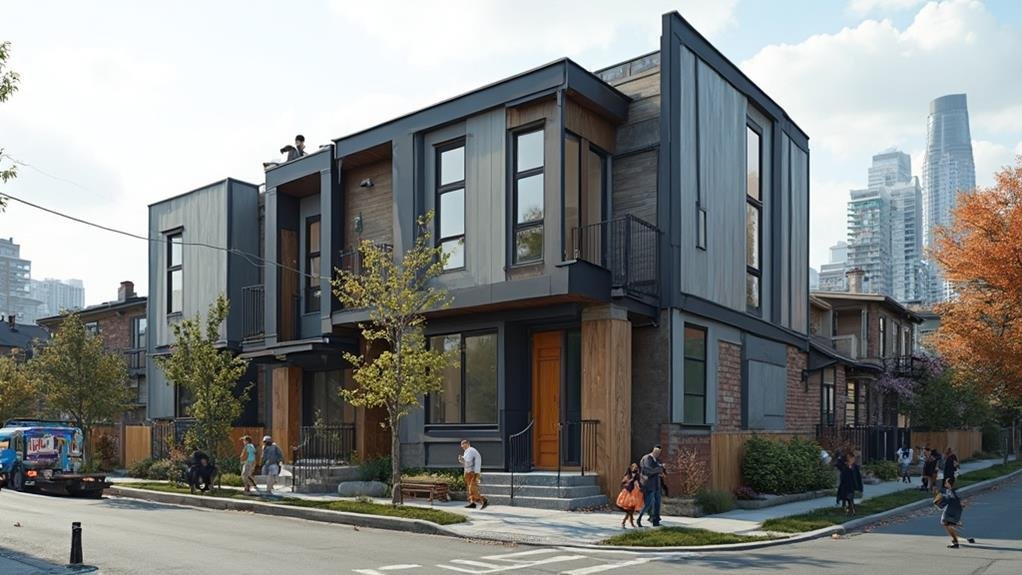
Modular homes in Toronto are attracting a diverse range of potential buyers and renters. These affordable housing options appeal to:
- Landowners seeking additional rental income
- Families wanting to keep relatives close
- Investors looking for new opportunities
- First-time homebuyers priced out of traditional homes
You'll find that modular homes offer unique family housing solutions and investment opportunities. They're ideal for creating garden suites, providing separate living spaces for extended family members.
As a landowner, you can boost your income by renting out these units. The rental market could see lower costs compared to traditional homes, making them attractive to tenants.
Demand for ground-based homes is likely to rise, contributing to a more diverse rental landscape. However, you'll need access to capital or equity for financing.
Regulatory Hurdles and Zoning Laws
While modular homes offer promising solutions, they face significant regulatory challenges in Toronto. You'll encounter zoning regulations that may restrict where you can place these homes. Many areas are designated for specific housing types, making it difficult to introduce modular units.
Building codes also present hurdles. These homes must meet the same standards as traditional construction, which can be complex for prefabricated structures.
You'll need to navigate:
- Permit processes
- Inspections
- Safety requirements
Additionally, some neighborhoods have strict aesthetic guidelines that modular homes mightn't meet.
You'll find that overcoming these barriers requires:
- Working closely with city planners
- Potentially seeking variances
- Educating local authorities on modular construction benefits
Despite these challenges, progress is being made. As demand grows, regulators are beginning to adapt, potentially paving the way for more widespread adoption of modular homes in Toronto.
Future Prospects and Policy Needs
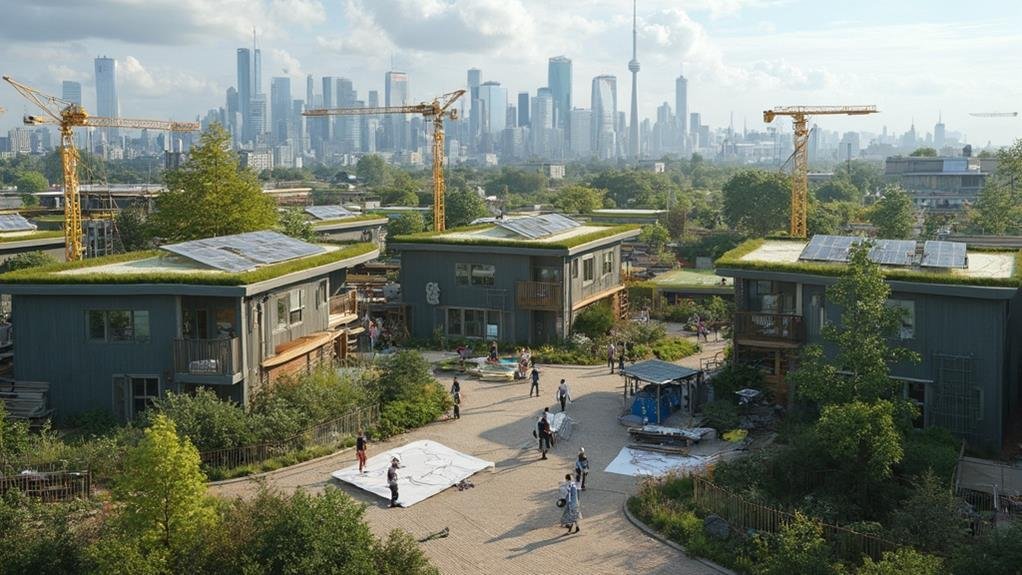
Looking ahead, the future of modular homes in Toronto hinges on essential policy changes.
You'll need to watch for new regulations that address:
- Land access and ownership
- Financing options for buyers
- Zoning laws for garden suites
- Incentives for sustainable construction
These changes could open up the potential of modular homes to ease housing shortages.
You'll see increased sustainability benefits as prefab solutions become more efficient. Community engagement will play a significant role in acceptance.
As policies evolve, expect innovations in design and materials. Costs may decrease, making modular homes more accessible.
The rental market could diversify, offering more affordable options. Government support for auxiliary dwellings might grow, stimulating interest in prefab housing.
Watch for shifts in financing that make it easier to invest in modular homes. These developments could reshape Toronto's housing landscape, providing new opportunities for homeowners and renters alike.
Conclusion
You've seen the potential of modular homes in Toronto's market. They offer quick, affordable housing solutions but face challenges. Land costs, regulations, and public perception remain hurdles. However, with policy changes and growing acceptance, modular homes could transform urban living. They'll provide options for first-time buyers and investors alike. As Toronto grapples with its housing crisis, prefab construction may become a key part of the solution. Keep an eye on this evolving market segment.


